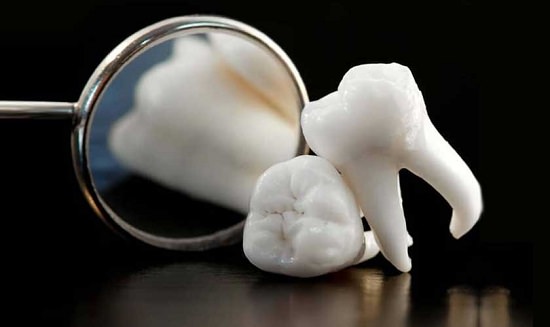Can wisdom teeth cause jaw pain? Learn more about jaw pain and wisdom teeth in this in-depth article that covers it all.
Humans are diphyodont; they have two sets of teeth in their lifetime. Normally babies are born without any teeth. The primary dentition/baby teeth/milk teeth start to come in at six months of age, with two little front teeth in the lower jaw known as mandible. More teeth gradually emerge to complete the set at around 2.5-3 years. The 20 tiny milk teeth fit perfectly into a child’s jaw and complete their toothy smile. Teeth don’t grow in size, but people do.
A fully developed adult jaw warrants a bigger set of larger teeth. Permanent dentition/ adult teeth that are 32 teeth that progressively replace the baby teeth, start at six years and fully take over in your early 20s when the wisdom teeth come to the fore.
The size, shape and position of teeth determine their various functions such as:
- Mastication is responsible for the breaking down of food.
- Aiding in speech like the pronunciation of words and articulation of sounds.
- Giving shape to the face.
The teeth are arranged in an arch in each of the jaws that are:
The Maxilla or the upper jaw, the madible or the lower jaw and midline that are symmetrical on either side.
The mouth has four quadrants, each containing an equal number of teeth that are 8 in adults.
Classification of Teeth Based on Form and Function:
- Incisors: They are sharp-edged ‘cutting teeth’ that are 2 in number; one central and one lateral.
- Canines: They are less developed in humans as compared to canines [dogs] and they support incisors functionally.
- Premolars: Absent in milk teeth/primary dentition and located in front of molars in adults.
- Molars: Located at the back, they have larger surfaces to grind and pulverize food before swallowing.
The third molars or wisdom teeth are the last to erupt [17-21 years], when one is older and supposedly wiser, hence the name. Myth has it that wisdom teeth are a relic of the past when humans had a diet of mostly meat and raw foods. Such food items required extra chewing power to process.
As we lose our baby teeth and our adult teeth start to erupt, there is an unavoidable pain and discomfort that accompanies the process; this ache is self-resolving and usually subsides within a week.
The eruption of the third molar poses a distinct set of problems. It can commonly be impacted, teeth impaction is a situation where a tooth fails to attain its normal functional position.
The impacted tooth may be unerupted, partially, or even fully erupted in an abnormal location. The human jaw size is supposedly shrinking due to an increasingly ‘soft’ diet. A soft diet doesn’t provide the necessary stimulus for jaw growth and it leaves no space for the third molars.
Complications Due to An Impacted Third Molar
- Pericoronitis: It is an inflammation and infection of the gums surrounding the third molar. This could be due to an accumulation of bacterial plaque biofilm.
- Dental caries: Decay in the third molar and nearby teeth due to poor oral hygiene like hard-to-clean teeth in abnormal position; food gets stuck in irregular gaps.
- Cysts and tumors: While this is rare, they vary in presentation, so careful consideration of any potentially aggressive or malignant changes in the hard and soft tissues is crucial.
- Periodontitis: Impaction can lead to an inflammation of the tissues that support the tooth; prevalence and severity of Periodontitis increase with age.
- Root resorption: Pressure from the impacted third molar can slowly start ‘eating away’ or destroy the adjacent second molar.
Can Wisdom Teeth Cause Jaw Pain
If left unchecked, the impacted wisdom tooth may lead to pain, infection, and swelling that can ravage the neighboring teeth and the jaw. Consult a dentist in case of prolonged or severe discomfort. A radiographic examination [x-ray] confirms impaction, and the tooth may also be extracted.



